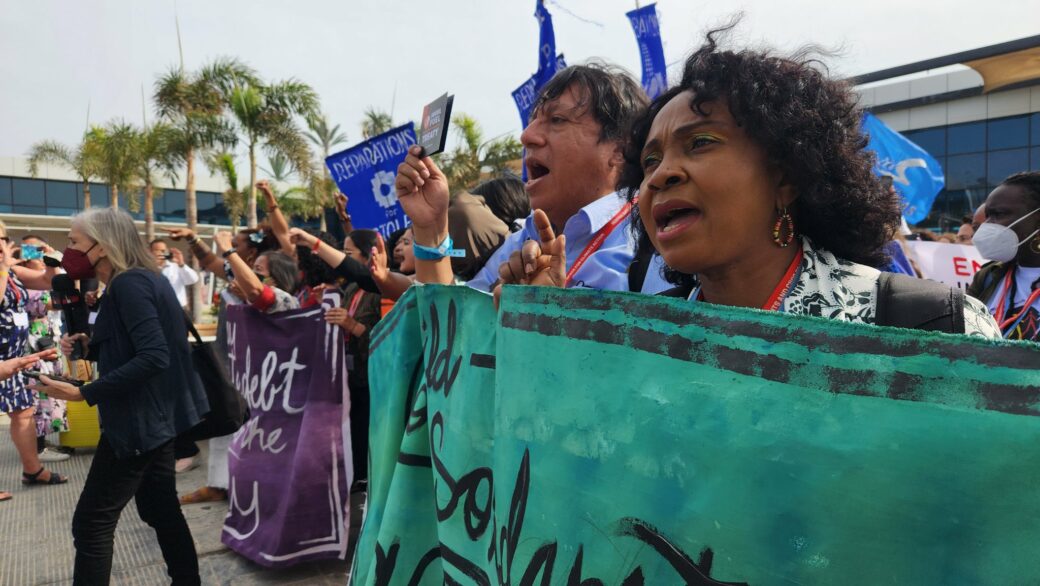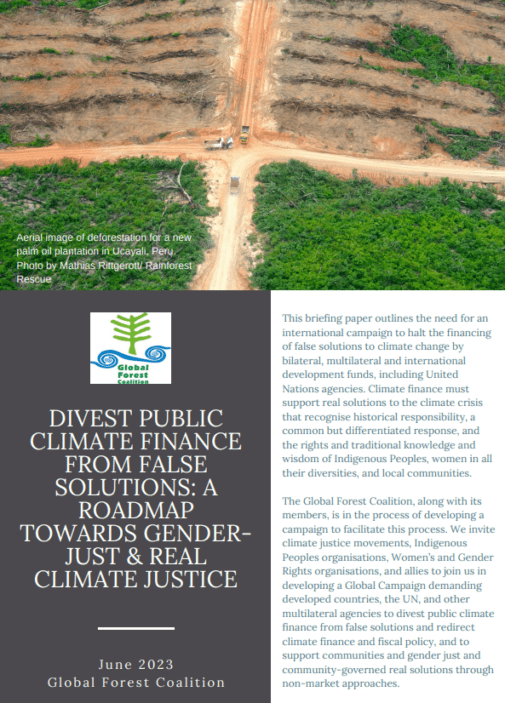COP27 Peoples’ Declaration for Climate Justice

17 November 2022, Sharm El Sheikh–Hundreds of climate activists, Indigenous representatives, human rights activists, environmental defenders, workers and feminist groups gathered today for the People’s Plenary at COP27. They signed a People’s Declaration for Climate Justice that includes demands to decolonize economies and societies, repay climate debt, and address global warming by reducing emissions to zero by 2030. The statement ends with a call for the release of the imprisoned Egyptian activist Alaa Abd El-Fattah and all other political prisoners. The People’s Plenary was followed by a march outside the plenary hall.
COP27 Peoples’ Declaration for Climate Justice
We, the representatives of Indigenous Peoples’, Women and Gender, Youth, Workers and Environmental and climate justice movements across the world, on behalf of thousands of organisations and millions of peoples gathered here at COP27 in Sharm El Sheikh, hereby note:
Climate change already impacts and threatens billions of lives, with billions more on the line. It is those that have contributed the least to cause climate change that are most impacted, especially women, Black, Indigenous Peoples, and people of colour, workers, peasants and rural people, youth, people with disabilities, local and frontline communities.
The climate crisis amplifies the structural inequalities and injustices that have been hardwired into our economic and political systems which have resulted in a spiralling debt crisis, a global cost of living crisis, growing inequality and poverty, a breach of planetary limits, and destruction of Mother Earth.
Despite the numerous and dire scientific warnings, time is running out to keep the global temperature rise below 1.5 degrees celsius. Countries of the Global North including the United States, United Kingdom and those in the European Union have the greatest historical responsibility for emissions.
They have grown rich through centuries of colonisation of Indigenous Peoples’ and ongoing exploitation of Global South communities and nations, including those of Indigenous People’s across the globe, and have refused to do their fair share to address the crisis nor pay their climate debt and reparations for the loss and damage they have caused. Instead, they are now back peddling on their already weak commitments by expanding oil and gas exploration and production, including the current dash for gas across Africa.
At the same time, we are seeing the rise of, authoritarianism, dictatorship, and fascism resulting in the criminalisation, harassment, imprisonment and murder of those who are working for a better world for all.
We recognise that:
1. There can be no climate justice without human rights and Indigenous Peoples’ Rights. We call on all governments to stop the shrinking of civic space, to respect the rights and dignity of Indigenous Peoples, workers, climate activists, human rights activists and environmental defenders.
2. The climate crisis has a disproportionate impact on the rights of millions of marginalised peoples, workers and communities across the world, particularly in the Global South and Indigenous Peoples in all countries, due to their reciprocal relationship with land and the historical discrimination they have been subjected to. Climate change amplifies existing inequalities and injustices, denying basic human rights, including the right to life, the right to health, the right to safe and decent housing,the right to food, the right to livelihoods and decent jobs, the right to a healthy environment,and the right to cultural sovereignty.
We demand system change that includes:
1. The Decolonisation of the Economy and Our Societies
Ensure and enable just transitions that guarantees everyone the right to live with dignity and in balance with our planet. The transition must be democratic following the principles of a care economy. It must be, inclusive and result in justice, a just transition for workers and impacted communities, and all peoples, including a just transition to 100% peoples-owned decentralised renewable energy systems through a fair and equitable phase out of fossil fuels and prioritise universal public services, including health and education; food sovereignty and agroecology; social protection, labour rights and decent living wages and restores nature and respects the inherent rights of Mother Earth.
2. The Repaying of Climate Debt and Delivering The Money
Rich countries need to repay their climate debt by reducing emissions to real zero by 2030 as recommended by the IPCC and pay finance for climate impacts, including adaptation and loss and damage, as part of a wider call for reparations for the extraction of wealth and exploitation of people and the planet that has deliberately impoverished the global south.
They need to deliver needs-based funding at the scale and urgency required. Funding must be public, grant-based, new and additional and reach peoples and communities most impacted. Finance can be sourced through the introduction of wealth taxes on the top 1%, taxes on the profits of big polluters. In addition, we demand the immediate debt cancellation
of unsustainable and illegitimate debt.
3. The Defence of 1.5c with Real Zero Goals by 2030 and Reject False Solutions
Fossil fuels are the core driver of the climate emergency. Nations must commit to lead a swift, just, and equitable phaseout of fossil fuel production by 2030 to stay well below 1.5C. We must transition to just and equitable people-owned, decentralised renewable energy and energy efficiency systems to prevent catastrophic harms to all peoples. We cannot allow the fossil fuel industry to continue writing the rules and bankrolling the climate negotiations. We must end corporate capture and restructure the system so that it serves people, not the greed of polluters. Governments must categorically reject false solutions and the “net zero” plans that disguise policies and intentions to continue polluting. This includes offsetting, carbon markets, carbon capture technologies, nature-based solutions, geoengineering, climate smart agriculture, and others that are ineffective, unjust, risky, and destructive. Rich countries who are the most responsible for causing the crisis can not now engage in carbon colonialism and must fully decarbonise by 2030 in line with the IPCC science.
4. Build Global Solidarity, Peace & Justice
Rebuild multilateralism and co-operation as the basis for internationalism, peace and justice, with an end to all wars, occupations and conflicts. Ensure a safe and enabling environment for civil society. Build global solidarity amongst peoples, workers and communities as a basis for a movement for justice and peace. Ensure that human rights are at the centre of all climate action and negotiations.
We stand with all of our movements facing shrinking civic space, including repression, criminalisation and imprisonment. Those who seek to turn the dreams of a better world into reality inspire us, guide us and galvanise us to remain brave and courageous. The courage of our peoples here and in every corner of the world is rooted in – SOLIDARITY.
We, the people, declare for all the world to hear that there can be no climate justice without human rights. Our fight is for the very future of humanity and a liveable planet. It’s a life and death fight. We refuse to allow the peoples of the Global South, Indigenous Peoples in every country, and frontline communities to be sacrificed.
We pledge that we will never stay silent in the face of injustice and to stand shoulder to shoulder with those in need.
With one voice we call for the immediate release of Alaa Abd El Fattah and all other prisoners of conscience. We are not yet defeated and we will never be defeated!
#FreeAlaa #FreeThemAll








